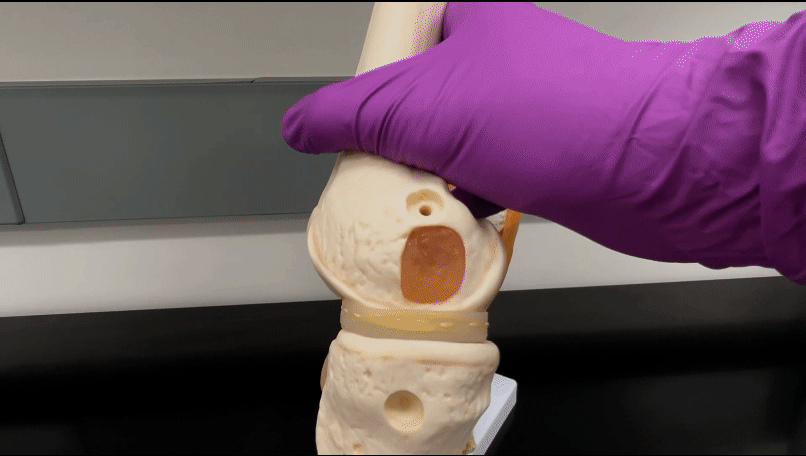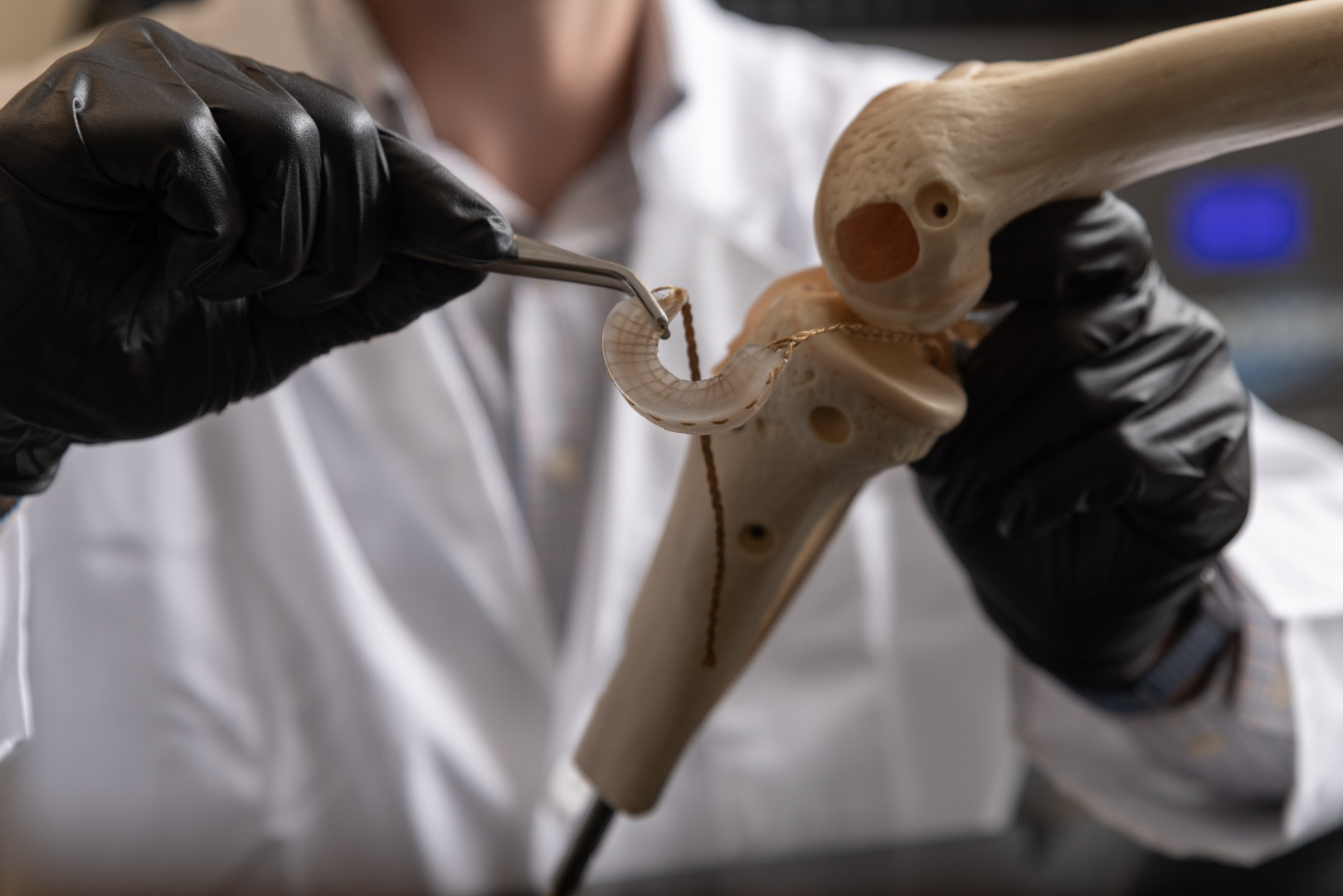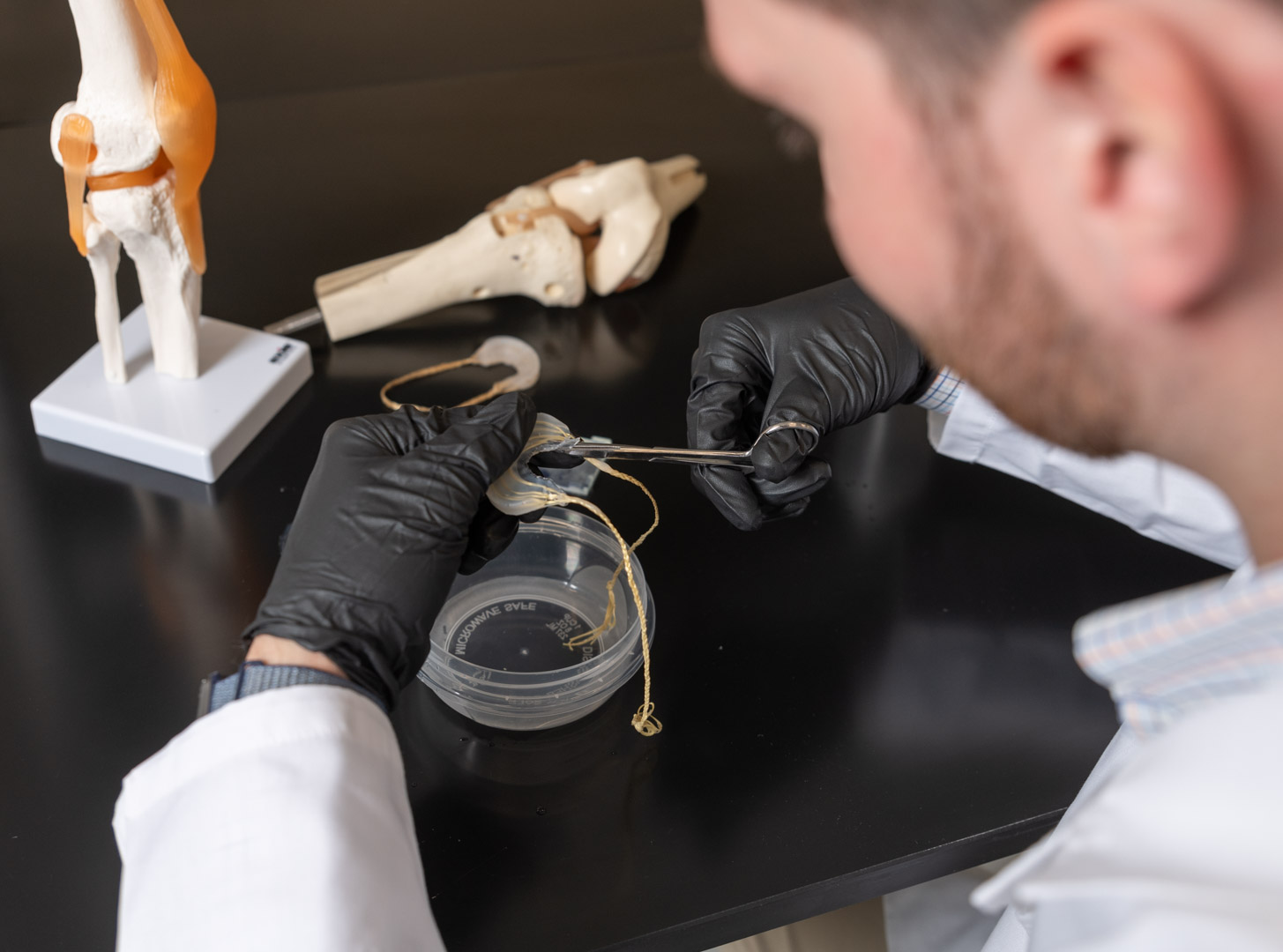Tech Alum Launches Meniscus Implant Startup
Jul 11, 2024 —

Jonathan Schwartz, OrthoPreserve's founder and CEO, places the meniscus implant into position in a knee model. Credit: Rob Felt
OrthoPreserve, a startup founded by Georgia Tech alumnus Jonathan Schwartz, is striving to make debilitating meniscus injuries a thing of the past and to address the long-term complications associated with meniscus tears, a common issue among athletes and aging adults.
The meniscus is a C-shaped structure that acts as a shock absorber and stabilizer in the knee, distributing impact and protecting bone cartilage from deteriorating. Meniscus injuries are frequent in sports — aggressive movements from running or rapidly adjusting leg positions can cause the meniscus to overextend and tear. The risk of injury also increases with age. Over time, degeneration in the knee can wear down the meniscus, making it weaker and easier to tear, even during normal daily activities.
“Right now, the main treatment for meniscus injuries is surgery to cut out the damaged part of the meniscus to relieve pain and impairment, but pain often returns within a few years due to degradation,” Schwartz said. “Once the meniscus is cut, the only treatments are pain medication, injections, physical therapy, and even knee replacement.”
According to Schwartz, over half of meniscus surgery patients, regardless of age, get early-onset arthritis because a severed meniscus can no longer cushion the knee as effectively.
“Patients don’t like hearing that the only treatment available is to cut out their meniscus — which will accelerate arthritis development,” Schwartz said. “Our mission is to use our meniscus implant to help people return to activity quickly and avoid the long-term consequences of surgery.”

The implant functions like a natural meniscus in the knee. Credit: Jonathan Schwartz
From Academia to Industry
Schwartz’s journey to entrepreneurship began at Georgia Tech, where he enrolled as a bioengineering Ph.D. student and joined the Biofluids and Medical Device Research Group, led by David Ku, Regents’ Professor and Lawrence P. Huang Endowed Chair for Engineering Entrepreneurship. There, Schwartz and Ku discussed potential areas of need in the medical device field. Growing up in a family that experienced numerous knee and meniscus issues and having a longstanding interest in orthopedics, Schwartz decided to design an implant that could mimic the properties of the natural meniscus.
After two years in the program developing a prototype, Schwartz left Georgia Tech with a master’s degree to work in the biopharmaceutical industry. In 2021, he co-founded OrthoPreserve with orthopedic clinicians Cyrus Kump, M.D., and Max Guillot, PA-C.
While working full-time, Schwartz both improved upon his prototype and developed his company on the side. But when he secured a National Institutes of Health research grant for his implant in 2023, he left his job to pursue OrthoPreserve exclusively.
An Innovative Implant
Made from a biocompatible hydrogel material reinforced with high-strength fibers, the implant mimics the shape, structure, and biomechanical properties of the meniscus. It is designed to restore normal joint mechanics and provide long-term protection and stability to the knee joint.
The company has also developed a minimally invasive surgical technique, allowing patients to recover quickly after a short surgery entailing just four or five small incisions. During surgery, the natural meniscus is removed, and the meniscus implant is attached to the knee joint similarly to the natural meniscus.
OrthoPreserve recently completed its first animal study in sheep, with promising results.
"All the sheep were able to walk normally within two or three weeks, and the implants held up without breaking down,” Schwartz said. “The cartilage was protected at the same level as the natural meniscus on the sheep’s other knees.”
This year, Schwartz met with the FDA and laid out a testing plan that will allow the company to start trials in humans within two years. The next animal study will last six to 12 months and will assess the long-term protective capabilities of the implant. After testing, the next steps will be to start human clinical trials and refine manufacturing techniques.
A Campus Community
OrthoPreserve’s home base is BioSpark Labs, a life sciences incubator space in Georgia Tech’s Science Square district. It is a collaborative startup environment that provides office space, shared laboratories, and equipment.
“We built BioSpark Labs because there was a need for more wet lab space and cleanroom space in the Atlanta area, and we wanted to keep biotech research coming out of Atlanta, and especially Georgia Tech,” said Noriko Walker, associate director of Portfolio Management in Georgia Tech’s Real Estate Office. “We kept hearing researchers say they have companies in Boston or San Francisco, and we wanted to provide a place where they could stay, do their research, and grow their companies here instead.”
For Schwartz, one of the most valuable benefits of BioSpark is access to Georgia Tech’s core facilities.
“It is a great atmosphere that comes with the vast resources available for research at Georgia Tech,” he said. “We also plan to take advantage of our location and look to Georgia Tech talent when we start hiring.”
Schwartz has several goals for OrthoPreserve. He wants to address the significant clinical need to help meniscus injury patients recover quickly, remain symptom-free, and avoid getting arthritis or a knee replacement. He wants to reduce the high costs associated with ongoing pain treatment and invasive surgeries. Improving patients’ quality of life is also on the list.
“With serious meniscus injuries, you can't get the joy you used to from being active, and often you just have to sit on the sidelines and watch. We hope our implant can help these patients resume their normal activities and do the things they love.”

The meniscus implant features a reinforcement fiber layout that mimics the natural meniscus's collagen fiber network. Credit: Rob Felt

Schwartz trims the implant after molding the hydrogel base material during the manufacturing process. The company currently manufactures the implants by hand in the lab but is in the process of developing an automated and scalable manufacturing method. Credit: Rob Felt
Catherine Barzler, Senior Research Writer/Editor





